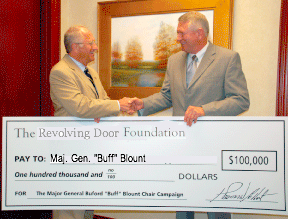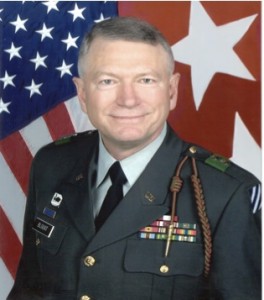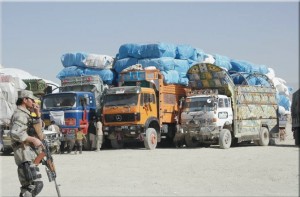 In 2003, US Army Maj. Gen. Buford “Buff” Blount led the Third Infantry Division into Baghdad, where he “parked his tanks literally on Saddam’s front lawn.”
In 2003, US Army Maj. Gen. Buford “Buff” Blount led the Third Infantry Division into Baghdad, where he “parked his tanks literally on Saddam’s front lawn.”
Now five years retired from government service, Blount is cashing in on the long military occupations that have followed his moment of glory.
He founded Blount Consulting LLC, a Mississippi corporation, in 2005. The new company quickly won two smallish military research and development contracts.
The contracts, worth a combined $177,400, originated with the Defense Advanced Research Projects Agency, or DARPA, the agency which gave us the internet and remote-controlled cockroaches.
 Blount also signed on as chief operating officer for The Sandi Group, a much larger company than his own. TSG was founded by an Iraqi-American businessman, Rubar S. Sandi. Sandi sought out “a vast range of business opportunities” in post-war Iraq—from hotels to telecoms to airlines—and TSG claimed to be Iraq’s leading employer after the invasion.
Blount also signed on as chief operating officer for The Sandi Group, a much larger company than his own. TSG was founded by an Iraqi-American businessman, Rubar S. Sandi. Sandi sought out “a vast range of business opportunities” in post-war Iraq—from hotels to telecoms to airlines—and TSG claimed to be Iraq’s leading employer after the invasion.
Since 2003, TSG has received at least $5.2 million in private security contracts in Iraq, according to US government auditors.
TSG has also won US government contracts in Afghanistan. Yesterday, the Pentagon gave a $30 million supply distribution contract to Safe Ports of Charleston, South Carolina, a company that has a joint venture with TSG.
Blount would appear to be just another ex-government manager turning his connections into cash—a practice that’s all the more less troubling for being so routine.
Unfortunately, there’s more to the story: Blount’s current employer recently wound up on a list of companies whose shoddy subcontracting practices may be keeping the Taliban in business.
TSG was among the trucking contractors named in a headline–grabbing Congressional investigative report released in June, 2010: “Warlord, Inc.: Extortion and Corruption Along the U.S. Supply Chain in Afghanistan.” According to the report, TSG “subcontracted out all trucking to local Afghan subcontractors.”
 This sloughing off of responsibility creates a problem, because the subcontractors to the big foreign outfits—like TSG—tend to hire local security companies with less than sparkling reputations. As the report put it:
This sloughing off of responsibility creates a problem, because the subcontractors to the big foreign outfits—like TSG—tend to hire local security companies with less than sparkling reputations. As the report put it:
The principal private security subcontractors on the [Afghanistan trucking] contract are warlords, strongmen, commanders, and militia leaders who compete with the Afghan central government for power and authority. Providing “protection” services for the U.S. supply chain empowers these warlords with money, legitimacy, and a raison d’etre for their private armies.
One such subcontractor, profiled in the report, is known to local villagers as “The Butcher.”
The report explains why men with nicknames like “The Butcher” may not be ideal beneficiaries of the trickle-down of US tax dollars in Afghanistan:
Warlordism is antithetical to the Afghan state, and ultimately to U.S. counterinsurgency strategy in Afghanistan, yet these warlords have flourished providing security for the U.S. supply chain there.
Among those who’ve profited from a business that undermines American efforts to win over the Afghan people, while empowering warlords of dubious loyalty?
None other than the US Army general who “liberated” Baghdad.